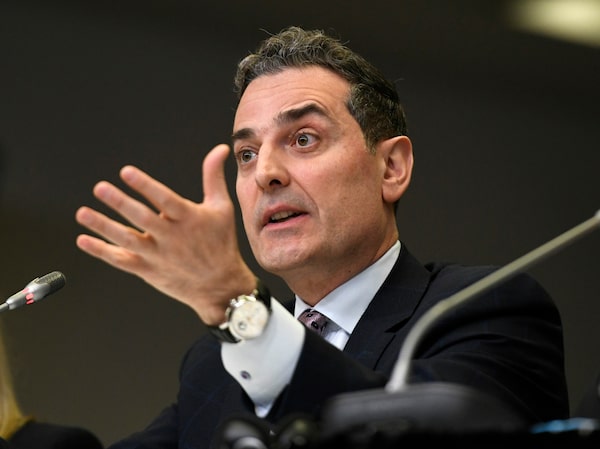
Mirko Bibic, president and CEO of BCE and Bell Canada, speaks during a CRTC hearing in Gatineau, Que., on Feb. 19, 2020.Justin Tang/The Canadian Press
BCE Inc. BCE-T paid out millions of dollars in performance bonuses to its top executives after falling short of its 2023 financial targets, slowing its dividend growth and announcing thousands of job cuts.
The company paid chief executive officer Mirko Bibic an annual bonus of $2.96-million as part of a $13.43-million compensation package last year, the company disclosed in its proxy circular to shareholders. His bonus was down slightly from $3.09-million in 2022.
Wade Oosterman, president of Bell Media until his retirement in January, received a bonus of $1.08-million as part of $4.87-million in total compensation. Three other executives in their roles for all of 2023 received bonuses of between $853,470 and $923,400 as part of pay packages between $4.5-million and $6-million.
In February, as it announced its 2023 results, BCE said it would cut 4,800 jobs, citing a difficult economic and regulatory environment. That was its largest restructuring in nearly 30 years, but its second announcement in less than 12 months: In June, BCE announced 1,300 cuts, primarily in management.
BCE also said its 2024 dividend would increase by 3.1 per cent, a slower rate of increase than typical in the past decade.
Spokesperson Ellen Murphy said Bell’s executive compensation policy is focused on attracting and retaining the best leadership talent and is based on “market rates, experience, scope of responsibilities and internal equity.” She says BCE base salaries are set at the 50th percentile of a group of companies it uses for comparisons, and 80 per cent to 90 per cent of executive officer compensation is at risk “to ensure that executive pay is aligned with our results as well as our longer-term strategy.”
The 2023 pay “reflects the corporate performance on financial and strategic measures in 2023 aligned to our strategic imperatives and ESG objectives,” she said.
In its compensation disclosure, BCE said it fell short of all three financial targets in its annual bonus plan – revenue, free cash flow and adjusted earnings before interest, taxes, depreciation and amortization (EBITDA). The misses were tiny: For example, BCE had a target of $10.454-billion for revenue, but posted $10.417-billion – a $37-million miss.
“Targets for each metric are set within financial guidance ranges and 2023 results for every metric were within our overall financial guidance ranges,” Ms. Murphy said.
BCE measured its “corporate performance index” used to calculate the payout at 93 per cent. Two-fifths of that corporate performance index is based on the achievement of six strategic imperatives, which included “operate with agility and cost competitiveness” and “engage and invest in our people and create a sustainable future.” BCE’s board gave the company a 100-per-cent rating on the strategic objectives.
BCE also adjusts bonuses based on the individual executive’s performance. The company said the average 2023 “individual performance index” was 1.2. The index can range from 0 to 1.5, with any number above 1 serving to increase a bonus.
BCE increased Mr. Bibic’s total compensation by $500,000 in 2023 “to continue his compensation progression and to address market competitiveness with direct competitors and BCE comparator group peers.”
That meant the stock-award portion of his compensation rose to $8-million from $7.5-million in 2022. His salary of $1.4-million was unchanged.
His reported total compensation dropped by about $160,000. Companies must include an estimate of the year’s change in the actuarial value of an executive’s pension, even though no cash is received that year by the executive. For Mr. Bibic, that estimate was about $525,000 less in 2023 than in 2022.
 David Milstead
David Milstead